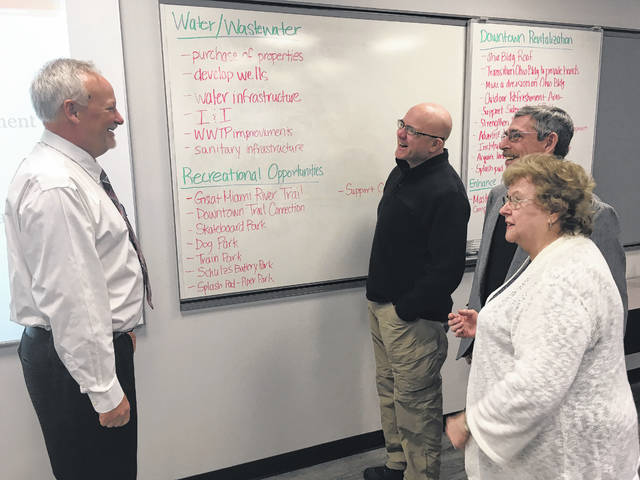
SIDNEY — Economic development, neighborhood revitalization and connectivity were topics of discussion during Sidney City Council’s biennial planning retreat, Monday.
The public meeting, brought to order by Mayor Mike Barhorst at 8:45 a.m., was held in the Nancy Adams Training Center at Sidney Fire Station 1. City Manager Mark Cundiff moderated the in-depth discussion of topics requested by council members.
The economic development discussion included dialogue about the advantages and disadvantages of council’s continued funding of the Sidney-Shelby Economic Partnership (SSEP) versus an economic development officer funded totally by the city. The role the Community Improvement Corporation can play in development projects, incentives offered to investors for economic development purposes, retail development, workforce development, city-owned industrial parks and the Sister City program were also considered.
Cundiff was asked about the tipping point at which shared economic development services with SSEP no longer made financial sense. During the subsequent discussion, members generally favored staying with SSEP for economic development services for the present time, but discussed the idea of forming a city-only Community Improvement Corporation.
Council then plunged into an analysis of neighborhood revitalization. Members discussed enhanced code enforcement, downtown housing, overlay zoning for historic districts and neighborhood preservation districts, and the amount of housing available at various price points.
“I’m frustrated,” Council member Joe Ratermann said during the conversation about neighborhood revitalization. “Since at least 2004, council has listed code enforcement as a goal. At what point does it become a priority?”
Ratermann’s question sparked a lively discussion about property maintenance codes. In the end, property maintenance codes were again listed as a goal.
Downtown housing also caused a great deal of conversation among members. The discourse morphed into a dialogue about neighborhood revitalization, the role tax incentives could play in the revitalization process, neighborhood associations and the role they could play in improving neighborhoods and the impact that HGTV has had on home buyer expectations and home affordability.
Council then moved to the topic of connectivity. Way-finding signage, the extension of the Great Miami Recreational Trail to Miami County, the extension of the trail system from Graceland to Custenborder Field, the extension of the trail north to Indian Lake, connectivity of the river to the downtown, river access points and improving the gateways into the city were all discussed.
There was also a conversation about the ‘Complete Streets’ program, which is a planning concept that designs streets that enable safe access for all users, including pedestrians, bicyclists, motorists and transit riders of all ages and abilities. Complete Streets make it easy to cross the street, walk to shops, and bicycle to work.
After a brief break for lunch, council then began sorting through goals each council member submitted in advance of the meeting. In no particular order, the categories included a focus on water/wastewater infrastructure, enhanced recreational opportunities, emphasis on downtown revitalization, enhance the major entrances/gateways to the city, neighborhood revitalization, an emphasis on public safety, an aggressive street maintenance program, economic development, improved intergovernmental cooperation, and staffing.
Cundiff provided members with estimated budget numbers for each of the items on the list of goals, and reminded members of the ground rules to think pro-active, but remember the financial impact of the goals established, and that no idea is a bad idea.
After discussing the goals, council members then voted to reduce the list to contain the following:
• Continue the development of the underground water source through the purchase of additional property and the establishment of additional wells;
• Continue to pursue enhanced recreational opportunities through the development of recreational trails including the Great Miami River Trail and collaborating with the Shelby County Park District;
• Focusing on downtown revitalization by marketing tax incentives for redevelopment of properties, transitioning the Ohio Building into private ownership, and supporting the efforts of Sidney Alive;
• Finding ways to revitalize neighborhoods, including the downtown, through concerted efforts with the Shelby County Land Reutilization Corporation and strengthening property maintenance codes for rental, vacant, and owner-occupied housing and commercial properties;
• Supporting the passage of a permanent tax levy to support public safety services;
• Supporting the passage of a permanent levy to support the aggressive maintenance of streets.
“I thought this year’s retreat format enabled council to cover a great deal of territory in a short period of time,” Council member Darryl Thurber said. “The discussion was good, and coming to an agreement about a handful of major goals will allow us to focus our energies and make significant progress.”
Council member Steve Wagner agreed. “This was a worthwhile exercise that will enable us to focus our efforts on targeted, attainable goals.”
“In past years, we’ve come away from these goal-setting sessions with more goals than could reasonably be accomplished,” Barhorst said. “At the end of the day, we had hoped to have no more than five goals, and in reality, the fifth and sixth goals could be combined — we are simply looking at the quarter-percent tax approved by the voters five years ago and making it permanent, with part of it used for street maintenance and part for public safety.”
Council is expected to formally adopt the goals at the April 23, 2018, regular meeting.


